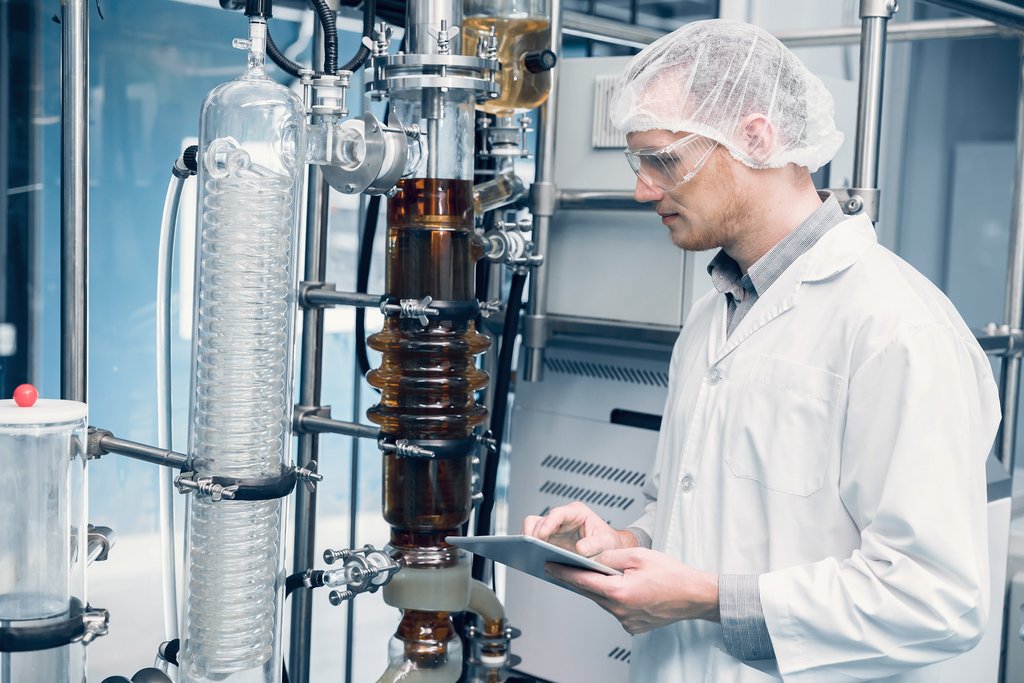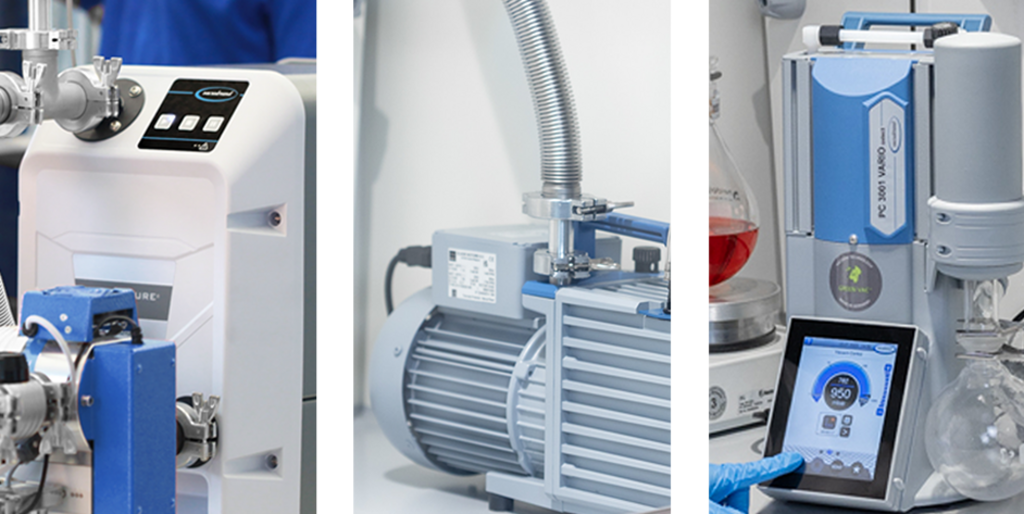Vacuum Distillation
Vacuum distillation is an advanced separation technique that operates under reduced pressure conditions. By lowering the pressure within the distillation apparatus, this method significantly reduces the boiling points of substances, enabling the separation of high-boiling or heat-sensitive compounds without thermal degradation. Vacuum distillation plays a vital role in chemical, pharmaceutical, and research industries, where precise separation and purity are essential.
Why and When Is Vacuum Distillation Used?
Vacuum distillation is commonly used in situations where standard atmospheric distillation is ineffective due to high boiling points or heat sensitivity. This technique minimizes the risk of thermal decomposition, making it ideal for separating:
- Heat-sensitive materials like pharmaceuticals and essential oils.
- High-boiling-point compounds in chemical and petrochemical processes.
By leveraging the principles of reduced pressure, vacuum distillation ensures efficient and effective separation while maintaining the integrity of sensitive compounds.

How Vacuum Distillation Works
Vacuum distillation—often referred to as fine vacuum distillation or high vacuum distillation—involves creating a low-pressure environment within a distillation system. This reduction in pressure decreases the boiling points of the compounds being separated, allowing distillation to occur at lower temperatures.
Key Components of a Vacuum Distillation Setup
- Vacuum Pump: Creates a reduced pressure environment.
- Distillation Column: Facilitates the separation of components based on their boiling points.
- Condenser: Cools and condenses the vapor back into a liquid.
- Receiver Flask: Collects the distilled fractions.
This setup ensures precise control over the distillation process, enabling efficient separation and recovery of desired components.
Process Requirements for Vacuum Distillation
To achieve optimal results in vacuum distillation, specific process requirements must be met:
- Pressure Control: Maintaining the correct vacuum level is critical to reducing boiling points without compromising separation efficiency.
- Temperature Regulation: Accurate temperature control is essential to prevent thermal degradation of heat-sensitive compounds.
- Chemical Compatibility: All system components, especially the vacuum pump and distillation column, must resist corrosion and degradation when exposed to aggressive solvents.
Meeting these requirements ensures efficient, reliable operation and minimizes downtime caused by equipment failures or suboptimal performance.

Pump Requirements for Vacuum Distillation
Choosing the right vacuum pump is crucial for achieving consistent results in vacuum distillation. Factors to consider include:
- Chemical Resistance: The pump must handle aggressive solvents and corrosive vapors.
- Ultimate Vacuum Level: A high-performance pump ensures the required pressure reduction for effective distillation.
- Flow Rate: Adequate pumping capacity prevents pressure fluctuations that could disrupt the process.
Recommended Solutions
BRANDTECH’S pumps are engineered to meet the demands of fine vacuum distillation, ensuring precision, efficiency, and durability.
VACUUBRAND vacuum pumps available from BRANDTECH Scientific are engineered to meet the demands of fine vacuum distillation, ensuring precision, efficiency, and durability.
Applications of Vacuum Distillation
Vacuum distillation plays a critical role in a variety of industries by enabling the efficient separation and purification of sensitive compounds. Its ability to lower boiling points while preserving material integrity makes it indispensable in processes where traditional distillation falls short. Here’s how vacuum distillation is applied across key fields:
Pharmaceuticals:
- Active Ingredient Purification: Vacuum distillation is essential for separating and purifying active pharmaceutical ingredients (APIs) that are heat-sensitive. For example, the production of antibiotics, vitamins, and biologics often relies on vacuum distillation to maintain the integrity and potency of these compounds.
- Solvent Recovery: In pharmaceutical manufacturing, vacuum distillation is used to recover and recycle solvents, reducing waste and cutting costs.
- Custom Formulations: Many specialty drugs require precise separations of complex mixtures, a challenge that vacuum distillation addresses effectively.
Petrochemicals:
- Crude Oil Fractionation: In the petrochemical industry, vacuum distillation is a critical step in refining crude oil. By operating at reduced pressures, it enables the separation of heavy hydrocarbons, such as diesel, lubricants, and asphalt, that would otherwise decompose under atmospheric conditions.
- Lube Oil Production: High-quality lubricants are distilled under vacuum to ensure consistency, stability, and performance, even under extreme conditions.
- Bitumen Processing: Vacuum distillation allows for the safe recovery and processing of bitumen, which is used in paving and roofing applications.
Research Laboratories:
- Small-Scale Separations: Academic and industrial research often involves distilling small quantities of complex mixtures to isolate specific components. Vacuum distillation provides the precision and control needed for these sensitive tasks.
- Material Purification: Researchers use vacuum distillation to purify solvents, reagents, and other materials required for experiments and analyses.
- Thermal Stability Studies: Vacuum distillation is also employed to study the thermal properties of new materials by enabling controlled separations at varying pressures and temperatures.
Food and Beverage Industry:
- Essential Oil Extraction: In the food and fragrance industries, vacuum distillation is used to extract and purify essential oils from plant materials. The lower temperatures preserve the delicate aromatic compounds that give these oils their characteristic scents and flavors.
- Flavor Concentration: The process is also applied to concentrate flavors in beverages, sauces, and other consumables while maintaining their natural profiles.
Fine Chemicals and Specialty Products:
- Purification of Heat-Sensitive Compounds: Fine chemicals, such as specialty solvents, catalysts, and additives, require vacuum distillation to achieve high purity levels without thermal degradation.
- High-Value Compounds: Industries producing high-value chemicals, such as polymers or advanced materials, rely on vacuum distillation to maintain quality and meet stringent specifications.
Frequently Asked Questions
Does Vacuum Distillation Lower Boiling Points?
Yes, vacuum distillation reduces boiling points by lowering the pressure within the system, enabling separation at lower temperatures.
What is the Difference Between Vacuum Distillation and Atmospheric Distillation?
Vacuum distillation operates under reduced pressure, lowering boiling points to safely separate heat-sensitive or high-boiling compounds, while atmospheric distillation occurs at normal pressure and is suited for stable, lower-boiling substances. Vacuum distillation is ideal for applications requiring gentle thermal conditions, whereas atmospheric distillation is commonly used for less sensitive compounds. The choice depends on the material's thermal stability and processing needs.
What is the Best Vacuum Pump for Distillation?
The ideal pump depends on your specific process requirements. For demanding applications, the Vacuu Pure 10C and RC6 Chemistry Hybrid Pump are excellent choices due to their performance, reliability, and chemical resistance.



